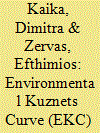| Srl | Item |
| 1 |
ID:
125854


|
|
|
|
|
| Publication |
2013.
|
| Summary/Abstract |
According to the environmental Kuznets curve (EKC) theory, the process of economic growth is expected to limit the environmental degradation created in the early stages of development. The first article of this study reviews the empirical studies examining various factors, other than income, that may lead to an EKC-pattern. The current article reviews in the first part the major critiques on the EKC-speculation which relate to the following issues: the normal distribution of world income, the feedback from environmental degradation to economic growth, the characteristics of the pollutant in question, various econometric issues, the evolution of consumption when income rises and the assumption about a common developmental pattern in all countries. The second part discusses additional matters reported indirectly in the literature and/or must be further examined. There are doubts whether the GDP-series captures the transition of production to the three productive sectors in empirical estimations and whether services are less polluting compared to industry activities. Finally, the original Kuznets-theory, which laid the groundwork for the EKC-concept, does not seem to solve income inequality problems.
|
|
|
|
|
|
|
|
|
|
|
|
|
|
|
|
| 2 |
ID:
125853


|
|
|
|
|
| Publication |
2013.
|
| Summary/Abstract |
The main purpose of this study is to capture the main features of the Environmental Kuznets Curve (EKC)-concept. According to the EKC-theory, the process of economic growth is expected eventually to limit the environmental degradation created in the early stages of development. The EKC concept leads many researchers from the early 1990s to assume that each economy should focus on its growth, and any environmental problems will be eventually eliminated by the process of economic growth. Several studies attempt to test empirically the EKC-hypothesis using data on many countries and examining various types of environmental degradation, while other studies examine the underlying factors that may drive such a relationship. This article reviews the evolution of the EKC-concept and the possible causes of an EKC-pattern, like the distribution of income, the international trade (pollution haven hypothesis), structural changes, technical progress and improvements in energy efficiency, institutions and governance and consumer preferences. As CO2 emissions are a pollutant with global effects, several studies deal with the possible EKC-pattern for CO2 emissions and these studies are discussed separately. The various critiques on the EKC-concept are reviewed in the second article of this work.
|
|
|
|
|
|
|
|
|
|
|
|
|
|
|
|